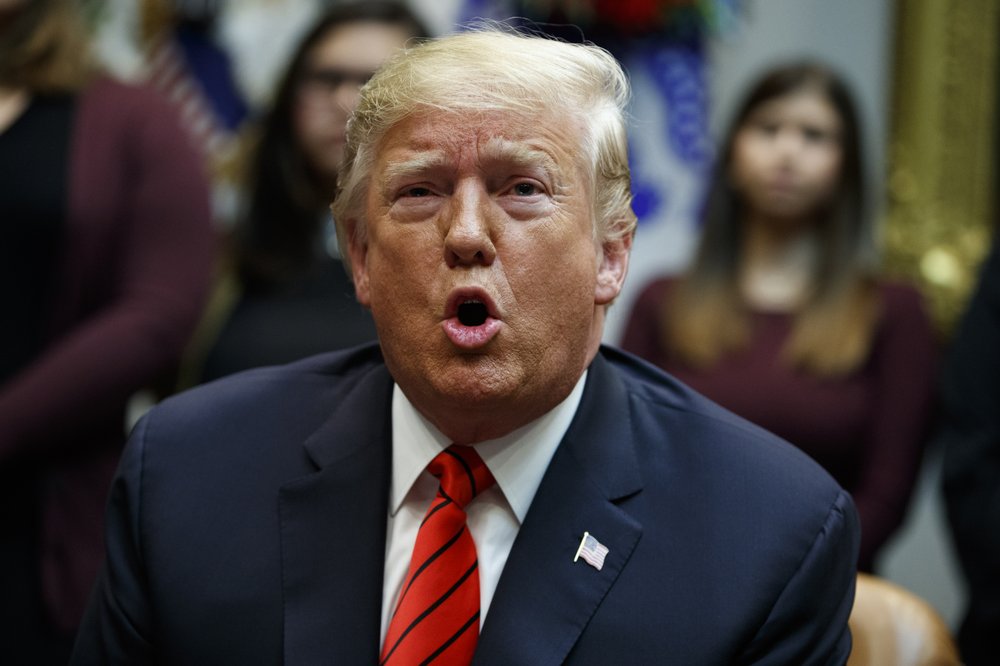
(Photo: AP)
Washington (People’s Daily) -- As the impeachment inquiry against President Donald Trump rapidly unfolds in Washington, both Democrats and Republicans are strengthening their offense and defense.
In the last three and a half weeks since Speaker Nancy Pelosi announced a formal impeachment inquiry, House investigators have broken through the administration’s stonewalling of Congress and heard dozens of hours of testimony from key witnesses. Trump is also venting his frustration at campaign rallies where his attacks on House Democrats and the media are serving to further energize his supporters.
Gordon Sondland, the US ambassador to the European Union, said during nearly nine hours of testimony on Thursday, he reluctantly indulged in what he described as the president’s efforts to run Ukraine policy through his personal lawyer Rudy Giuliani. He indicated that he opposed Trump’s orders to reach out to Giuliani, who was pushing the Ukrainian government to investigate Trump’s political rivals.
While Sondland was testifying behind closed doors, acting White House chief of staff Nick Mulvaney acknowledged for the first time that Trump decided to freeze critical military aid to Ukraine unless the country investigated the “server” theory. It was a stunning public admission, one that Trump and his allies have denied for weeks, and one that Democrats have been trying to substantiate through a series of closed door interviews. Mulvaney, however, later walked back the remark.
Next week, more witnesses are expected to testify as part of the inquiry into President Trump. Top US diplomat in the Ukraine Bill Taylor is scheduled to testify before the House committee on Tuesday according to a GOP source. Following him will be Philip Reeker, acting assistant secretary of European and Eurasian Affairs at the State Department, Alexander Vindman, director of European Affairs with the National Security Council, Suriya Jayanti, a foreign service officer stationed in Kiev, and Timothy Morrison, a top Russia adviser at the National Security Council.
As the inquiry widens, majority leader Senator Mitch McConnell is expected to approach any impeachment trial with an emphasis on protecting his Senate majority. Senator McConnell sat his colleagues down over lunch in the Capitol last week and warned them to prepare for an extended impeachment trial. According to people who were there, he came equipped with a PowerPoint presentation, complete with quotes from the Constitution, as he schooled fellow senators on the intricacies of a process he portrayed as all but inevitable.
While Trump has faced intense criticism in Washington over the Ukraine scandal and his abrupt withdrawal of US troops from Syria, he has reveled in the rock star reception he has received at rallies thousands of miles away in Minneapolis and Dallas. Supporters echo the president's attacks on impeachment, House Democrats and what Trump calls the "swamp" of Washington, DC. Like the president, they view impeachment as an illegitimate effort to take him down and defend his phone call with Ukraine's president in which he pushed for an investigation of former vice president Joe Biden, a top political rival. Impeachment, many said, will wind up re-electing Trump in 2020.
Analysts have pointed out that impeachment, of course, is inevitable. The House will support whatever charges are ultimately introduced because most Democrats think the president is not fully sane and at least somewhat criminal. Also, they’re Democrats and he’s a Republican. The charges will involve some level of foreign policy malfeasance.
The ultimate outcome depends on the Senate. It takes 67 votes to convict. Republicans control the Senate 53-47, and it is unlikely 20 of them will agree to remove a president of their own party. An acquittal is likely but not fated, because we live in the age of the unexpected.
Everything depends on the quality and seriousness of the House hearings. Polling on impeachment has been fairly consistent, with Gallup reporting Thursday 52 percent supporting the president’s impeachment and removal. Serious and dramatic hearings would move the needle on public opinion, tripping it into seriously negative territory for the president.
The public, however, has seen virtually none of it and that dynamic could ultimately threaten the Democrats’ bid to get public opinion firmly on their side. Except for an initial open hearing, Democrats on the House Intelligence Committee have so far conducted their impeachment investigation entirely behind closed doors.
The closed door strategy runs counter to another Democrat goal. The lack of televised hearings could limit their ability to capture attention and build voter support for the party’s case against Trump, which Pelosi had long made a prerequisite for pursuing impeachment in the first place.


